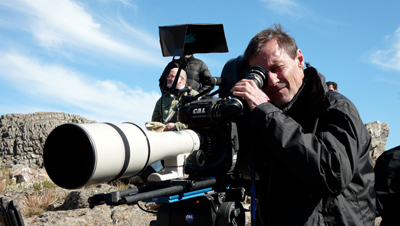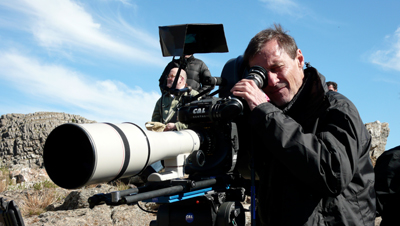
(RNS2-MAY02) Filmmaker Roland Joffe on the set of “There Be Dragons,” a new film about St. Josemaria Escriva, the founder of Opus Dei. For use with RNS-DRAGONS-FILM, transmitted May 2, 2011. RNS photo courtesy Michel Lichtenstein/Motive Entertainment.

(RNS2-MAY02) Filmmaker Roland Joffe on the set of “There Be Dragons,” a new film about St. Josemaria Escriva, the founder of Opus Dei. For use with RNS-DRAGONS-FILM, transmitted May 2, 2011. RNS photo courtesy Michel Lichtenstein/Motive Entertainment.
(RNS) Would you rather see a movie about a sinner or a saint?
The marketing team for the new Roland Joffe film, “There Be Dragons,” is going for a little of both.
The film tells the story of St. Josemaria Escriva de Balaguer, the founder of the Opus Dei order that was last seen on film as a secretive murderous cabal in “The Da Vinci Code.”
It’s also a dramatic wartime epic set during the Spanish Civil War, and the latest release by Joffe, the Oscar-nominated director of “The Mission,” a 1986 movie that similarly appealed to both spiritual and secular audiences.
For the Christian market, the movie poster shows a statue of an angel wielding a sword and the words “faith, forgiveness and redemption.” The mainstream version shows a soldier — and it’s not St. Josemaria — gazing upward amid the chaos of war, with the tagline, “Even saints have a past.”
Such divergent strategies are now standard marketing for a film with strong religious themes, said Paul Lauer, CEO of Motive Entertainment, which also handled publicity for “The Passion of the Christ” and the “Narnia” films.
“It’s kind of like a political campaign, where you have slightly different emphasis or issues that you would stress in one market or another,” he explained.
“We’re talking to moviegoers and we want to stress what particular aspects of the film connect with them individually.”
In the seven years since Mel Gibson’s “The Passion” was released, social networking has made it even easier to market a Christian film to a general audience. Controversy can also help sell a film to a wider audience, especially for viewers who remember the villainous portrayal of Opus Dei from “The Da Vinci Code.”
Motive Entertainment started its publicity efforts more than a year ago, when “Dragons” was still filming in Argentina. Samuel Goldwyn Films came on board a few months ago to focus on the mainstream marketing.
For the film’s Friday (May 6) opening, the faith-based campaign has mobilized Catholics to sell 50,000 tickets across the country, a “buyout” effort that will help spread the word during its limited release.
“It shouldn’t just appeal to Catholics, but should appeal to everyone,” said Victor Saenz, a graduate student and newly minted Opus Dei member in College Station, Texas, who has organized group outings to see the film.
“I wouldn’t tag it as a movie about a saint — I would tag it as a movie about what it means to be human.”
Lauer’s agency is also marketing to evangelicals and other Protestants, touting the film’s universal Christian themes of forgiveness, reconciliation and redemption.
“We think that this saint in particular has some real connectability to non-Catholic Christian audiences,” Lauer said.
In contrast to “The Passion” and its ultra-Catholic producer Mel Gibson, Joffe is a self-described “wobbly agnostic,” and most of the people who worked on “Dragons” were not Catholics.
But unlike the age-old story behind “The Passion” or the best-selling C.S. Lewis novels behind the Narnia films, “Dragons” has to overcome the challenge of obscure source material — the Spanish Civil War and St. Josemaria, which draw blank stares from many Americans.
“We had to start almost from zero,” Lauer said. “There’s a general awareness of Opus Dei, but it’s so warped because it’s based on “The Da Vinci Code” version.”
The film takes place in flashbacks, based around a journalist who’s working on a biography of the would-be saint. He asks his elderly father — a fictional childhood friend of St. Josemaria’s — to share memories of his youth and Spain’s violent 1930s.
Despite its mainstream slogan about saints having “a past,” the film doesn’t present anything shocking or unflattering about St. Josemaria’s early life, a relief for Catholics who feared another “Da Vinci Code” situation.
Early critics worried the film sounded like a propaganda piece for both St. Josemaria, who had been accused of having fascist sympathies, and Opus Dei, an order that was accused of being secretive, overly aggressive in recruitment and too conservative long before “The Da Vinci Code” version came along.
(BEGIN OPTIONAL TRIM)
“The problem with a good story that is compelling yet not accurate is that it can help to rewrite history,” said Lynn Schofield Clark, editor of “Religion, Media and the Marketplace” and director of the University of Denver’s Estlow International Center for Journalism and New Media.
“`There be Dragons’ seems positioned to refute (“The Da Vinci Code”) viewpoint, but only by possibly replacing it with another myth that rewrites the organization’s history.”
Although not directly involved in the filmmaking process, Opus Dei leaders are pleased with the depiction, with spokesman Brian Finnerty calling it “a great opportunity to plant good seeds among a wide audience.”
Because the film focuses only on St. Josemaria’s youth and the order’s early years, Opus Dei has prepared online videos and other educational materials to pick up the story where the film drops off.
Mary Gabriel, one of Opus Dei’s 8,000 U.S. “cooperators,” has helped organize three theater buyouts in the Washington, D.C. area, tailoring her pitch to her parish as the story of St. Josemaria, and to her coworkers as a Roland Joffe wartime epic.
“You don’t want to give the impression that it’s a super-religious film,” she said. “People see it as a much more religious film if they’re particularly religiously-minded, but other people who aren’t just see it as a great story about friends and forgiveness.”




